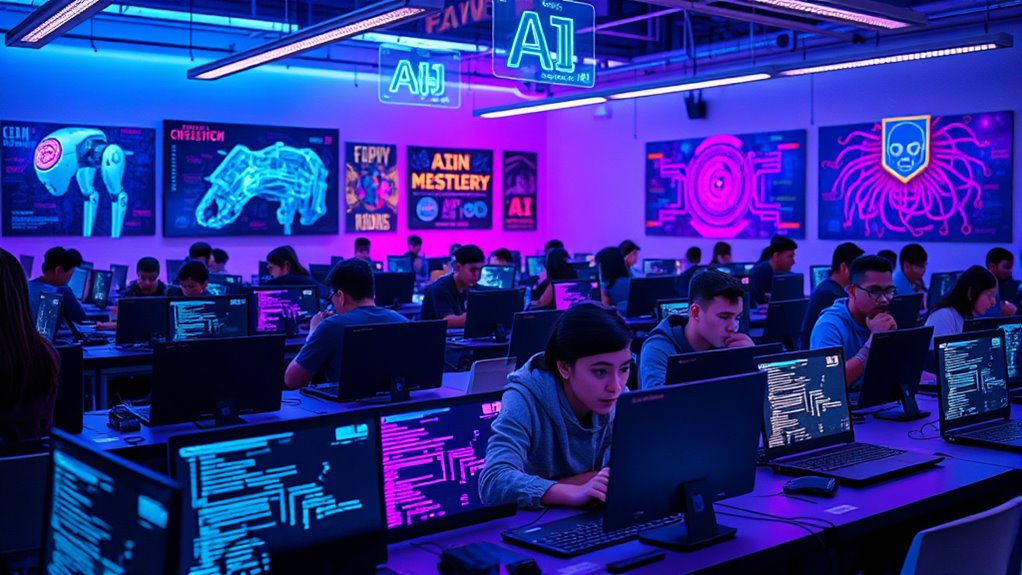Applications for AI degrees are soaring as Gen Z seeks to lead in this fast-changing tech world. You’re part of a generation interested in transforming industries, creating new opportunities, and addressing ethical challenges in AI. Pursuing an AI degree can open doors to high-demand careers in areas like healthcare and finance. If you want to discover how this trend shapes your future and the ethical considerations involved, keep exploring the incredible possibilities ahead.
Key Takeaways
- Increasing interest among Gen Z students is driving a surge in applications for AI degree programs worldwide.
- The rapid growth of AI’s industry impact motivates young learners to pursue specialized education.
- Students are attracted to AI careers due to high demand, lucrative salaries, and diverse opportunities across sectors.
- Ethical considerations in AI development are a key part of modern curricula, appealing to socially conscious Gen Z applicants.
- Pursuing AI degrees positions Gen Z students at the forefront of technological innovation and societal change.

As interest in artificial intelligence continues to grow, applications for AI degree programs are soaring across universities worldwide. You’re likely aware that AI is transforming industries, creating new opportunities, and shaping the future. But as more students like you pursue this field, vital conversations are emerging about ethics debates and career prospects. These discussions aren’t just academic—they directly impact your decision to study AI and how you navigate your career afterward.
When you think about ethics debates, you realize that AI isn’t just about coding and algorithms. It’s about the moral implications of automation, data privacy, bias, and decision-making. As you dive deeper into AI coursework, you’ll encounter debates over how algorithms can perpetuate inequality or be misused. These ethical issues matter because they influence the trust people place in AI systems, and they’ll impact your reputation and responsibilities as an AI professional. Many universities now emphasize responsible AI development, encouraging students to consider societal impacts. Engaging with these debates prepares you to address real-world challenges and helps you stand out in a competitive job market.
AI ethics involve automation, data privacy, bias, and societal impacts shaping trust and responsibility in the profession.
Speaking of career prospects, you’ll notice that AI skills are in high demand across sectors—from healthcare and finance to entertainment and cybersecurity. Companies are enthusiastic to hire graduates who understand not only the technical aspects but also the ethical considerations of AI. This surge in demand means better job security, higher salaries, and more diverse opportunities. You might be excited to know that careers in AI aren’t limited to software development; roles include data scientist, machine learning engineer, AI ethicist, and product manager. As you build your expertise, you’ll find that your skills can open doors to innovative startups or established giants like Google, Microsoft, and Amazon. The rapid growth in AI applications means you’re positioning yourself for a future where your skills will be essential.
However, it’s vital to stay aware of the ethical debates shaping AI’s development. Employers value professionals who can balance technical mastery with an understanding of societal impacts. Your ability to navigate these ethical issues will influence your career trajectory, making you not just a coder but a responsible innovator. As AI continues to evolve, so too will the conversations about its role in society, ensuring your education remains relevant and impactful. In this dynamic landscape, your pursuit of an AI degree puts you at the forefront of technological progress, with the power to shape a future that’s both innovative and ethically sound.
Frequently Asked Questions
What Are the Core Skills Taught in AI Degree Programs?
In AI degree programs, you learn core skills like AI algorithm development and data ethics. You’ll develop algorithms that enable machines to learn and make decisions, while understanding the importance of ethical data use. Courses also cover machine learning, programming languages like Python, and data analysis. These skills prepare you to create responsible AI solutions, ensuring your work benefits society and adheres to ethical standards.
How Do AI Degrees Differ From Computer Science Degrees?
AI degrees are like specialized maps guiding you through a jungle, focusing on AI ethics and machine learning techniques. Unlike computer science degrees, which cover a broad range of programming and systems, AI programs dive deep into designing intelligent systems, understanding ethical implications, and applying machine learning. You learn to create algorithms that mimic human intelligence, making you more specialized in AI’s unique challenges and opportunities.
What Industries Are Most Hiring AI Graduates?
You’ll find AI graduates in industries like tech, healthcare, finance, and automotive, where they tackle AI ethics and develop innovative solutions. Companies often form industry partnerships to advance AI applications responsibly. Your skills are in high demand for roles that require understanding both the technical and ethical aspects of AI, making you a valuable asset in sectors focused on ethical AI deployment and cutting-edge innovation.
Are There Online AI Degree Programs Available?
Yes, you can find online AI degree programs on various online learning platforms. These platforms often offer AI certifications that complement your studies and boost your credentials. You can enroll in courses from top universities and institutions, making it convenient to learn AI at your own pace. With these options, you can gain practical skills and stay competitive in the job market without needing to attend traditional on-campus programs.
What Ethical Considerations Are Covered in AI Education?
Think of AI education as a moral compass guiding your journey through uncharted digital waters. You’ll explore topics like AI bias and data privacy, learning to spot biases lurking like shadows and protect sensitive information like a digital fortress. This education arms you with ethical awareness, ensuring you build fair, responsible AI systems. You become not just a coder but a steward of trust in the tech world’s evolving landscape.
Conclusion
As you consider the evolving landscape, it’s clear that AI’s magnetic pull is quietly reshaping your options. The surge in AI degree applications hints at a future where innovation quietly becomes your new companion. Embracing this shift means opening doors to possibilities you might not have imagined. So, as the world gently nudges you toward this exciting path, remember that the next big chapter is often just a step beyond the horizon, waiting for you to take it.










